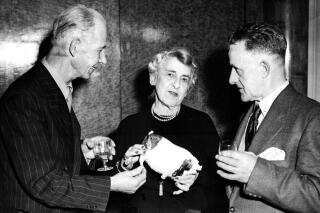Today in History: April 15, the Titanic sinks in the North Atlantic, more than 1,500 die

Survivors of the Titanic, from left, Reginald Burgess, 64, from Southampton, Edith L. Russell, from Cincinnati, Ohio, USA, and Edward Ryan, from Hull, Yorkshire, are shown in this undated photo at the Odeon Theatre, Leicester Square, London, England. The trio and eleven other survivors are attending a reception in connection with the film, “A Night to Remember” that is to be filmed by the Rank Organization. Russell, a fashion journalist and a first-class passenger on the Titanic, is holding the “lucky pig” that she had taken with her on the ill-fated voyage. Burgess was a chef’s assistant and Ryan a passenger on the ocean liner that sank April 15, 1912. (AP Photo)
Today in History:
On April 15, 1912, the British luxury liner RMS Titanic foundered in the North Atlantic off Newfoundland more than 2 1/2 hours after hitting an iceberg; 1,514 people died, while less than half as many survived.
On this date:
In 1865, President Abraham Lincoln died nine hours after being shot the night before by John Wilkes Booth at Ford’s Theatre in Washington; Andrew Johnson became the nation’s 17th president.
In 1892, General Electric Co., formed by the merger of the Edison Electric Light Co. and other firms, was incorporated in Schenectady, New York.
In 1945, during World War II, British and Canadian troops liberated the Nazi concentration camp Bergen-Belsen. President Franklin D. Roosevelt, who died on April 12, was buried at the Roosevelt family home in Hyde Park, New York.
In 1947, Jackie Robinson, baseball’s first Black major league player of the modern era, made his official debut with the Brooklyn Dodgers on opening day at Ebbets Field. (The Dodgers defeated the Boston Braves, 5-3.)
In 1955, Ray Kroc opened the first franchised McDonald’s restaurant in Des Plaines, Illinois.
In 1974, members of the Symbionese Liberation Army held up a branch of the Hibernia Bank in San Francisco; a member of the group was SLA kidnap victim Patricia Hearst, who by this time was going by the name “Tania” (Hearst later said she’d been forced to participate).
In 1989, 96 people died in a crush of soccer fans at Hillsborough Stadium in Sheffield, England. Students in Beijing launched a series of pro-democracy protests; the demonstrations culminated in a government crackdown at Tiananmen Square.
In 1998, Pol Pot, the notorious leader of the Khmer Rouge, died at age 72, evading prosecution for the deaths of 2 million Cambodians.
In 2009, whipped up by conservative commentators and bloggers, tens of thousands of protesters staged “tea parties” around the country three months into the presidency of Barack Obama to tap into the collective angst stirred up by a bad economy, government spending and bailouts.
In 2012, passengers and crew of the cruise ship MS Balmoral said prayers at the spot in the North Atlantic where the Titanic sank 100 years earlier.
In 2013, two bombs made from pressure cookers exploded at the Boston Marathon finish line, killing two women and an 8-year-old boy and injuring more than 260.
In 2019, fire swept across the top of the Notre Dame Cathedral as the soaring Paris landmark underwent renovations; the blaze collapsed the cathedral’s spire and spread to one of its landmark rectangular towers, but fire officials said the church’s structure had been saved.
In 2020, the government reported that the nation’s industrial output in March registered its biggest decline since the U.S. demobilized at the end of World War II as factories shut down amid the coronavirus epidemic.
In 2022, it was revealed that more than 900 civilian bodies had been discovered in the region surrounding the Ukrainian capital following the withdrawal of Russian forces. Police said many were “simply executed.”
